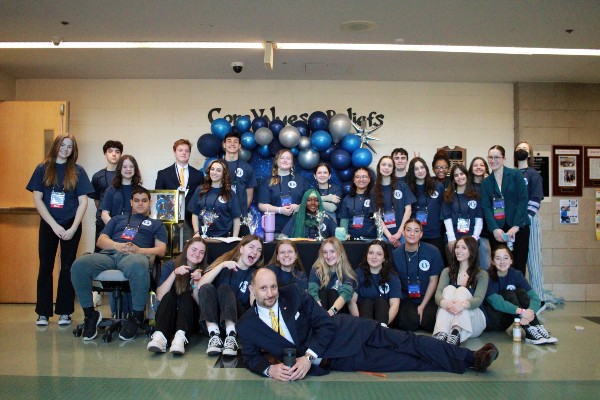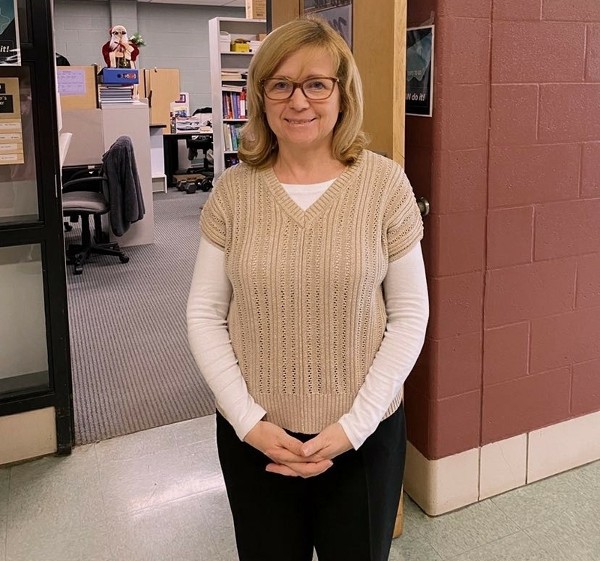Timothy Phipps is passionate about three things: his career, his family, and his coaching position.
Phipps has been teaching humanities, specifically as a history teacher, at Woodland since its inception in 2001.
For six of those years Phipps has taught American History, on the college prep and honors levels, and a class based on the complicated and intriguing topic of the Vietnam War.
Phipps proposed the class in 2002 but it was not instituted into the curriculum at Woodland until 2003.
“The class was offered to the students but was not put into their schedules until the second semester of the 2002-2003 school year,” said Phipps.
Phipps proposed the idea for the class at a department meeting, which was a combination of the Humanities History and Humanities English departments at that time. He pitched the idea to Michelle Papa, department head.
Phipps’ proposal was accepted on the basis that he would teach a class on the History of Connecticut in the first semester and then teach the History of Vietnam the second semester.
For the first few terms the History of Connecticut class was filled, but it progressively became less and less popular.
The class then went from being offered every year to every other year.
“It started off being History of Connecticut one semester then Vietnam the next but soon it was being offered every other year and eventually we stopped offering the class,” said Phipps.
The history of Connecticut was discontinued by Phipps for several reasons.
One reason, he felt, was that the class did not live up to the expectations of the students.
“There was a real disconnect between the students and the content of the class and we cant figure out why,” reported Phipps.
The option of taking History of Connecticut was stopped at the beginning of the 2008-2009 school year.
However, Phipps did continue teaching History of the Vietnam War, which became very popular among Woodland students.
The class takes a whole semester to cover the war, not in its entirety, but in the points that Phipps believes are the most important.
These key points include the French Indochina War, the prelude to America’s involvement, and also the effect the war had on America as a whole.
The curriculum of the course changes every year as Phipps refines the research he has done and applies it to the class.
The basis of the class covers the political, military, and social effects the Vietnam War had on America.
Phipps bases his changes in the curriculum on feedback he receives from his students on what they thought could be improved.
Phipps has always been passionate about the topic of passionate about this class, ever since his uncle, Brian Phipps first turned him onto the subject when he was a kid.
“My uncle Brian Phipps served with the U.S. Air Cavalry in Vietnam,” he stated, “this one member of our family went out and it had a tremendous impact on the family,”
Phipps was very close to his uncle who, unfortunately passed away a few years ago.
Phipps recalls a car ride he once took with his Uncle Brian. It was this car ride that persuaded Tim to display an even greater interest in speaking out about the truth in Vietnam.
“My Uncle came and picked my brother and I up from UCONN and since Connecticut was in the middle of a blizzard we were stuck in traffic. So my uncle turned to me and my brother and asked, do you guys want to hear about Vietnam,” said Phipps.
Phipps and his brother agreed to listen to their Uncle recall his experiences during the war, and both were given a new level of respect for their Uncle.
When Phipps brought the idea for the class to Papa those many years ago, he not only brought a plan but also a passion to the table.
It was this passion that helped propel the class to where it is today.
Phipps also has another reason for being so compelled to teach students one of the most troubled times in American history.
Phipps believes that the government was ashamed by the Vietnam War, “that is why it is on the verge of becoming a lost piece of American history,” said Phipps.
“This was a dark time in America for the C.I.A. and the Military,” continues Phipps.
“It was the first living room war and the media had a lot to do with shaping American perceptions of the war,” said Phipps.
The new media was able to bring the details of the war to Americans quickly; battles such as the My Lai massacre and the Tet Offensive were brought to American citizens with a reporters twist on it.
“The war was actually brought to peoples living rooms, and these people needed gaps filled in.
These gaps were being filled in by personal takes and opinions of the reporters, and to me at least, the war was not portrayed to the American people in a very accurate light,” said Phipps.
Examples such as this are reasons why Phipps believes that the war is becoming a lost piece of American history.
Phipps said that American people started asking why a mighty country such as America, with its advent of new and powerful military hardware, could not beat these poorly equipped peasant armies.
It is because of this reason that the United States Government pushed aside this very important era of American history.
“The government was ashamed that the mighty U.S. could be taken down by these peasants with Chinese and Russian assault rifles, how Russian assault rifles,” said Phipps.
Phipps goes on to talk about how near the end of the war several massacres and wartime atrocities were pushed into Americans faces at home.
When the details of the massacres at My Lai and Hue were presented to the American public, people became disturbed and upset at the things taking place in that faraway country.
“When the war ended it became a period of time that Americans needed to shut the door on, and it became taboo to talk about it because you were essentially bringing up a horrific defeat, not even a noble defeat suffered by the American people,” said Phipps.
Phipps wants to shed light to this problem through his class, which has been one of his main goals since day one.
Because the Vietnam War became a taboo subject in America after its conclusion, Phipps feels that the younger generation is not learning what it should be about the war, ensuring the loss of the truth forever.
The implications of the Vietnam War are still playing a major role in America today, making it essential that people understand where they came from in order to understand where they are going.
“War is an extension of Politics, and the politicians during that time period played a large role in how the war was actually fought,” said Phipps.
The consequence of bureaucratic interruption in wartime efforts then, are having a negative effect on today’s military.
Phipps is trying to maintain his primary goal in spreading the truth about Americas involvement during the Vietnam War.
He continually strives to reach this goal in order to ensure that the truth about what happened in Vietnam lives on.
“It killed me to see that these veterans who fought so bravely, to be brushed aside,” said Phipps.
Phipps believes that it is critical that students learn this time period in history, to learn the mistakes, and to learn how to correct them.
Phipps will keep propelling the class forward, hopefully keeping this colorful period alive.
Phipps said, “It was a roller coaster of emotion to see what my uncle went through. It was sad to hear about the things that he saw and did, but I was very proud about the things he accomplished, and this is why I decided in college to use teachings as a means to teach
Timothy Phipps is passionate about three things his career, his family, and his coaching position.
Phipps has been teaching humanities, specifically as a history teacher, at Woodland since its inception in 2001.
For six of those years Phipps has taught American History, on the college prep and honors levels, and a class based on the complicated and intriguing topic of the Vietnam War.
Phipps proposed the class in 2002 but it was not instituted into the curriculum at Woodland until 2003.
“The class was offered to the students but was not put into their schedules until the second semester of the 2002-2003 school year,” said Phipps.
Phipps proposed the idea for the class at a department meeting, which was a combination of the Humanities History and Humanities English departments at that time. He pitched the idea to Michelle Papa, department head.
Phipps’ proposal was accepted on the basis that he would teach a class on the History of Connecticut in the first semester and then teach the History of Vietnam the second semester.
For the first few terms the History of Connecticut class was filled, but it progressively became less and less popular.
The class then went from being offered every year to every other year.
“It started off being History of Connecticut one semester then Vietnam the next but soon it was being offered every other year and eventually we stopped offering the class,” said Phipps.
The history of Connecticut was discontinued by Phipps for several reasons.
One reason, he felt, was that the class did not live up to the expectations of the students.
“There was a real disconnect between the students and the content of the class and we cant figure out why,” reported Phipps.
The option of taking History of Connecticut was stopped at the beginning of the 2008-2009 school year.
However, Phipps did continue teaching History of the Vietnam War, which became very popular among Woodland students.
The class takes a whole semester to cover the war, not in its entirety, but in the points that Phipps believes are the most important.
These key points include the French Indochina War, the prelude to America’s involvement, and also the effect the war had on America as a whole.
The curriculum of the course changes every year as Phipps refines the research he has done and applies it to the class.
The basis of the class covers the political, military, and social effects the Vietnam War had on America.
Phipps bases his changes in the curriculum on feedback he receives from his students on what they thought could be improved.
Phipps has always been passionate about the topic of passionate about this class, ever since his uncle, Brian Phipps first turned him onto the subject when he was a kid.
“My uncle Brian Phipps served with the U.S. Air Cavalry in Vietnam,” he stated, “this one member of our family went out and it had a tremendous impact on the family,”
Phipps was very close to his uncle who, unfortunately passed away a few years ago.
Phipps recalls a car ride he once took with his Uncle Brian. It was this car ride that persuaded Tim to display an even greater interest in speaking out about the truth in Vietnam.
“My Uncle came and picked my brother and I up from UCONN and since Connecticut was in the middle of a blizzard we were stuck in traffic. So my uncle turned to me and my brother and asked, do you guys want to hear about Vietnam,” said Phipps.
Phipps and his brother agreed to listen to their Uncle recall his experiences during the war, and both were given a new level of respect for their Uncle.
When Phipps brought the idea for the class to Papa those many years ago, he not only brought a plan but also a passion to the table.
It was this passion that helped propel the class to where it is today.
Phipps also has another reason for being so compelled to teach students one of the most troubled times in American history.
Phipps believes that the government was ashamed by the Vietnam War, “that is why it is on the verge of becoming a lost piece of American history,” said Phipps.
“This was a dark time in America for the C.I.A. and the Military,” continues Phipps.
“It was the first living room war and the media had a lot to do with shaping American perceptions of the war,” said Phipps.
The new media was able to bring the details of the war to Americans quickly; battles such as the My Lai massacre and the Tet Offensive were brought to American citizens with a reporters twist on it.
“The war was actually brought to peoples living rooms, and these people needed gaps filled in.
These gaps were being filled in by personal takes and opinions of the reporters, and to me at least, the war was not portrayed to the American people in a very accurate light,” said Phipps.
Examples such as this are reasons why Phipps believes that the war is becoming a lost piece of American history.
Phipps said that American people started asking why a mighty country such as America, with its advent of new and powerful military hardware, could not beat these poorly equipped peasant armies.
It is because of this reason that the United States Government pushed aside this very important era of American history.
“The government was ashamed that the mighty U.S. could be taken down by these peasants with Chinese and Russian assault rifles, how Russian assault rifles,” said Phipps.
Phipps goes on to talk about how near the end of the war several massacres and wartime atrocities were pushed into Americans faces at home.
When the details of the massacres at My Lai and Hue were presented to the American public, people became disturbed and upset at the things taking place in that faraway country.
“When the war ended it became a period of time that Americans needed to shut the door on, and it became taboo to talk about it because you were essentially bringing up a horrific defeat, not even a noble defeat suffered by the American people,” said Phipps.
Phipps wants to shed light to this problem through his class, which has been one of his main goals since day one.
Because the Vietnam War became a taboo subject in America after its conclusion, Phipps feels that the younger generation is not learning what it should be about the war, ensuring the loss of the truth forever.
The implications of the Vietnam War are still playing a major role in America today, making it essential that people understand where they came from in order to understand where they are going.
“War is an extension of Politics, and the politicians during that time period played a large role in how the war was actually fought,” said Phipps.
The consequence of bureaucratic interruption in wartime efforts then, are having a negative effect on today’s military.
Phipps is trying to maintain his primary goal in spreading the truth about Americas involvement during the Vietnam War.
He continually strives to reach this goal in order to ensure that the truth about what happened in Vietnam lives on.
“It killed me to see that these veterans who fought so bravely, to be brushed aside,” said Phipps.
Phipps believes that it is critical that students learn this time period in history, to learn the mistakes, and to learn how to correct them.
Phipps will keep propelling the class forward, hopefully keeping this colorful period alive.
Phipps said, “It was a roller coaster of emotion to see what my uncle went through. It was sad to hear about the things that he saw and did, but I was very proud about the things he accomplished, and this is why I decided in college to use teachings as a means to teach



















I love this class. It is so interesting and I feel the same way about the topic. It is so misunderstood and we as Americans should take time to learn about this point in time in our history. The Vietnam Vets came back without a welcome home. They fought for us and taking this class and trying to understand what happened helps give the respect and honor that they greatly deserve.
I love Vietnam class!
I wish I took Vietnam 🙁 Mr. Phipps is such a great teacher!